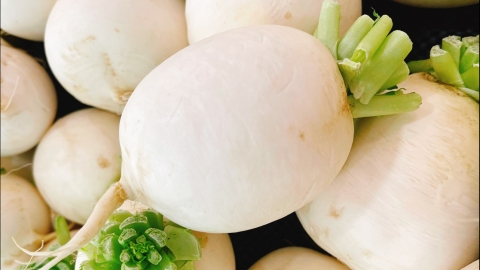What should white radish not be eaten with?
Generally speaking, as a common vegetable, daikon radish may interact with certain foods when consumed, potentially causing adverse reactions. Foods to avoid include oranges, wood ear mushrooms, persimmons, pork liver, and carrots. Medications to avoid include ginseng, astragalus root, deer antler, American ginseng, and polygonum multiflorum. Detailed explanations are as follows:

I. Foods
1. Oranges
Daikon radish contains thiocyanate, which inhibits the thyroid's absorption of iodine. The citric acid in oranges enhances this inhibitory effect, potentially leading to goiter.
2. Wood Ear Mushrooms
Daikon radish and wood ear mushrooms may interact during metabolic absorption, forming toxic substances that could cause dermatitis.
3. Persimmons
Persimmons contain tannic acid, which may react with components in daikon radish, causing precipitation that affects digestion and potentially leading to stomach discomfort and diarrhea.
4. Pork Liver
Pork liver contains iron and copper, while daikon radish contains vitamin C-decomposing enzymes. Consuming them together may destroy the nutrients in pork liver, reducing its nutritional value.
5. Carrots
Carrots contain ascorbic acid-decomposing enzymes that can degrade vitamin C in daikon radish, causing nutrient loss. Although this effect can be mitigated by adding vinegar, it is still recommended to avoid consuming large quantities together.
II. Medications
1. Ginseng
Daikon radish has diuretic properties, while ginseng is a tonic herb that benefits the spleen and stomach and nourishes blood to calm the mind. Consuming both together may accelerate the excretion of ginseng’s active ingredients, reducing its tonic effects.
2. Astragalus Root
Astragalus root is a herb known for replenishing central Qi. The qi-regulating and ventilating effects of daikon radish may prevent astragalus from fully exerting its medicinal effects.
3. Deer Antler
Daikon radish and deer antler have contraindications in combination. The diuretic and qi-dispersing effects of daikon radish may interfere with the nourishing effects of deer antler, preventing it from exerting its functions of replenishing qi and strengthening bones.
4. American Ginseng
American ginseng is a herb used for replenishing qi and nourishing yin. The stagnation-relieving effects of daikon radish may conflict with the qi-replenishing function of American ginseng, preventing its active ingredients from fully exerting their effects and reducing its benefits in enhancing immunity and relieving fatigue.
5. Polygonum Multiflorum
Polygonum multiflorum has functions such as nourishing the liver and kidneys and enriching essence and blood. The qi-regulating effects of daikon radish may interfere with the nourishing effects of polygonum multiflorum on the liver and kidneys, affecting its role in improving conditions such as liver and kidney yin deficiency and blood deficiency, thus impairing its therapeutic effects.
Therefore, during the period of taking traditional Chinese medicine, if you wish to consume daikon radish, it is best to first consult a professional TCM practitioner or pharmacist to ensure that interactions between medications and food do not adversely affect your health. Additionally, attention should be paid to moderate consumption to avoid excessive intake that may cause bodily discomfort.








